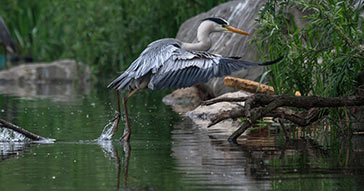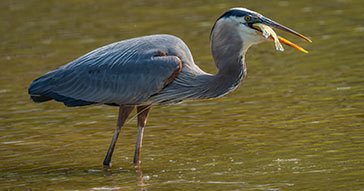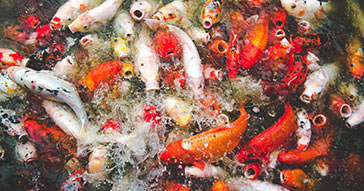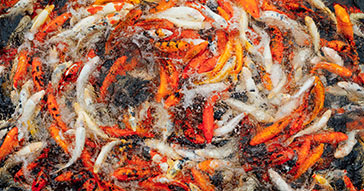Predators
Some of the most common predators of Koi ponds are raccoons, herons, and egrets.
Protecting Your Koi Pond from Predators
 Strong netting made of durable material and securely fastened can prevent predators from gaining access to your pond.
Strong netting made of durable material and securely fastened can prevent predators from gaining access to your pond.
Electric Fencing Can Protect Your Pond from Predators
 Homeowners who elect to protect their Koi pond from predators with the use of electric fencing should seek the services of a professional to ensure it is installed correctly and grounded to prevent any electrical hazards.
Homeowners who elect to protect their Koi pond from predators with the use of electric fencing should seek the services of a professional to ensure it is installed correctly and grounded to prevent any electrical hazards.
Motion Activated Sprinklers Can Help Deter Pond Predators
Some Koi pond owners use motion-activated sprinklers to deter predators. When activated, they spray a burst of water that can startle and deter predators.
Decoys can Help Deter Predators from Your Pond
 Some Koi pond owners use decoys (such as fake alligators or owls) to deter predators. Rotate their placement regularly so predators don’t become accustomed to them over time.
Some Koi pond owners use decoys (such as fake alligators or owls) to deter predators. Rotate their placement regularly so predators don’t become accustomed to them over time.
Avoid Overcrowding Your Koi Pond
Overcrowding in a spring Koi pond can lead to a number of problems including poor water quality, stunted growth, and increased aggression among fish.
Consider Pond Size to Avoid Overcrowding
 It's important to ensure that the pond is properly sized for the number of fish you keep, based on factors such as the size and age of the Koi. One of the main causes of overcrowding is because the pond is too small for the number of fish being kept.
It's important to ensure that the pond is properly sized for the number of fish you keep, based on factors such as the size and age of the Koi. One of the main causes of overcrowding is because the pond is too small for the number of fish being kept.
Overfeeding your Koi Can be Detrimental to Their Health
Larger fish require more food and can lead to overcrowding. Overfeeding can also increase the amount of waste in your aquarium.
Overcrowding Can Cause Stress in your Koi Fish
 When Koi are overcrowded, they may exhibit signs of stress such as clamped fins or a lack of activity. Stressed fish are more susceptible to disease and parasites.
When Koi are overcrowded, they may exhibit signs of stress such as clamped fins or a lack of activity. Stressed fish are more susceptible to disease and parasites.
Avoid Overcrowding Your Pond
To avoid overcrowding in a Koi pond, it's important to regularly monitor the fish and the pond environment. If necessary, some of the fish may need to be relocated to a larger pond or donated to another pond owner.